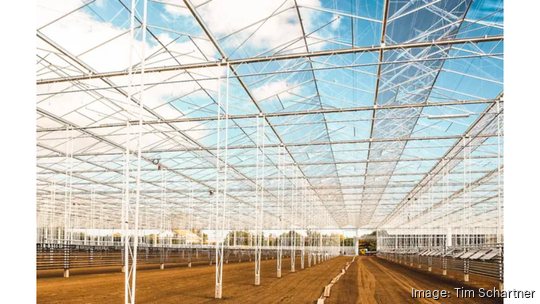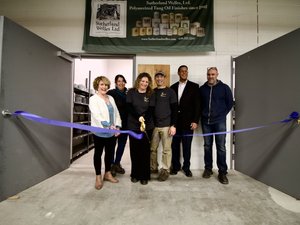
Schartner Farms has gone through many iterations over its 100-year history, according to co-owner and fourth-generation farmer Tim Schartner. At first, the Exeter-based operation was a dairy farm with a few hundred cows, he recounted. The family moved into truck farming, followed by potato farming for companies like Frito Lay, before transitioning into a traditional farmer's market model.
Now it's time for another change.
A couple of years back, Schartner founded RI Grows and started work on a new $58 million greenhouse outfitted with Controlled Environment Agriculture (CEA) and green tech that is expected to produce about 14 million pounds of organic tomatoes annually.
Plans for the new facilities include hydroponics technology, crops irrigated by captured rainwater and solar power for the entire facility. After hitting a snag in 2021, the project was hit with a cease-and-desist order from Exeter's Zoning Board of Review. This past January, that order was lifted, provided that Schartner merges three lots and “actively seek" development review for the greenhouse project. This week, Schartner told RI Inno he’s hopeful that the work he’s done over the past two months to meet the requirements will be enough. He’s set to present his latest plans at a Special Town Council meeting in his former school, Wawaloam Elementary School in Exeter, on Thursday, Mar. 9.
“We have to change to stay relevant,” he said. “There’s also a lot at stake for the farming community in Rhode Island.”
State relief, negative carbon footprint
Just a few days ago, RI Gov. Dan McKee announced new grant funding for farms and food organizations who produce locally. At last count, Rhode Island farms produced less than 2% of the veggies and fruits state residents consume each year, even though out-of-state produce is usually less nutritious than items grown locally, according to several studies.
Schartner said fruits and vegetables that are picked before they’re ripe, stored in a warehouse, then shipped thousands of miles lose vital nutrients and taste in the process.
In addition to using new technology, Schartner said the new greenhouse uses new carbon-capture techniques in which plants are used to scrub out carbon generated by the greenhouse. Even the utilities, which keep the greenhouse feeling "like July 27," are fitted with green tech, rendering the boilers on site as emergency backups.
“Once everything is up and running we should be producing more oxygen per square meter than the average forest in Exeter,” Schartner said. “We’re starting with a negative carbon footprint and once we ramp up, we’re hoping that will double.”
While the new building’s footprint is going to be much larger than the greenhouse that was previously on site, Schartner said it will see less traffic once built, due to the need for fewer employees and the fact that there won’t be a retail component on site.
Schartner said workers at the new farm will also be able to join their new farming-training program in partnership with the Rhode Island Department of Labor and Training, RINLA, the University of Rhode Island. The “learn while you earn” model, Schartner said, includes agriculture education ranging from understanding soil to production and harvest.
“This facility is a way forward for my kids, but it’s also the next step in where we need to go in terms of sustainable farming,” he said. “When my great grandfather got here from Austria, he worked his way up, but he and his friends got help. That’s what I’m trying to do here. I think this can help farmers stay in business if they start thinking of this modern approach with year-round greenhouses on their land.”
Sign up for The Beat, Rhode Island Inno’s free daily innovation newsletter. See past examples here.








